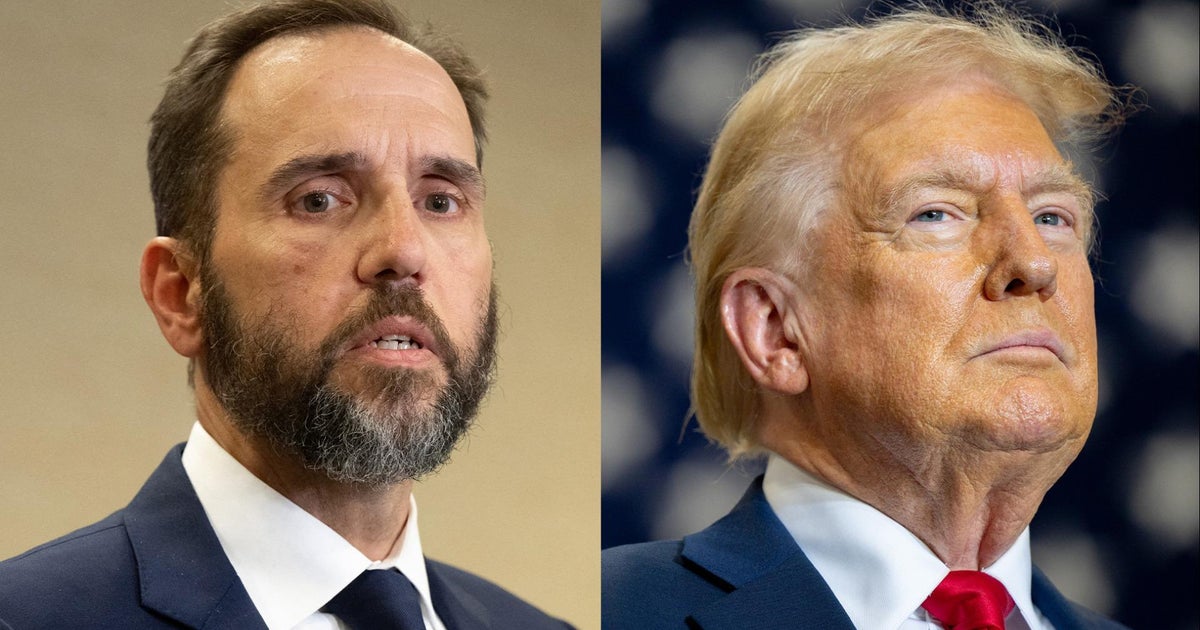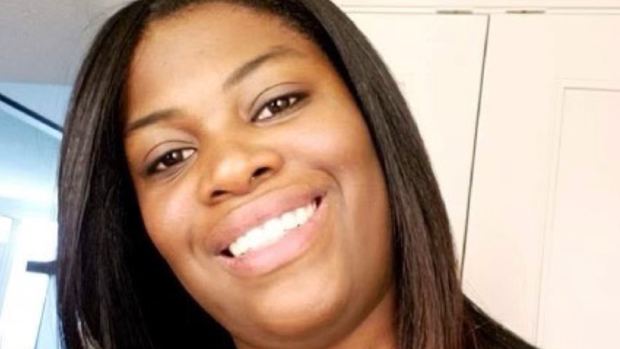CBS News
Biden to pardon turkeys in annual Thanksgiving tradition

Watch CBS News
Be the first to know
Get browser notifications for breaking news, live events, and exclusive reporting.
CBS News
Jack Smith seeks to dismiss charges against Trump in D.C. election case

Washington — Special counsel Jack Smith asked a federal district court in Washington on Monday to dismiss the case against President-elect Donald Trump stemming from an alleged scheme to subvert the transfer of power after the 2020 election, bringing to a close the historic and unprecedented prosecution of the nation’s 45th and 47th president.
In newly filed court documents, federal prosecutors working in Smith’s office told U.S. District Judge Tanya Chutkan that they are seeking to close Trump’s case because Justice Department policy forbids the prosecution of a sitting president.
“After careful consideration, the department has determined that [the Office of Legal Counsel’s] prior opinions concerning the Constitution’s prohibition on federal indictment and prosecution of a sitting president apply to this situation and that as a result this prosecution must be dismissed before the defendant is inaugurated,” Smith wrote. “That prohibition is categorical and does not turn on the gravity of the crimes charged, the strength of the government’s proof, or the merits of the prosecution, which the government stands fully behind.”
The special counsel noted the historic nature of Trump’s prosecution and subsequent election to the presidency, writing that the “department and the country have never faced the circumstance here, where a federal indictment against a private citizen has been returned by a grand jury and a criminal prosecution is already underway when the defendant is elected president.”
But after consultation with the Justice Department’s Office of Legal Counsel, the special counsel said “the department’s position is that the Constitution requires that this case be dismissed before the defendant is inaugurated.”
Smith said in his six-page motion that he conferred with Trump’s lawyers, and they do not object to the request to drop the case.
The judge is likely to grant Smith’s request to dismiss the case and toss the four federal counts against the president-elect, after which the special counsel is expected to submit a final report to the attorney general and resign. Smith’s request was expected, as he and the Justice Department were in talks about how to wind down the prosecution after Trump was elected to a second term earlier this month.
Smith was appointed special counsel by Attorney General Merrick Garland in November 2022 after Trump announced his third run for the White House. He took over two ongoing federal probes into Trump’s conduct, one focused on his alleged mishandling of classified records and the other tied to the 2020 election.
After a monthslong grand jury investigation, Smith obtained a four-count indictment against Trump that alleged he sought to resist the peaceful transfer of power following Joe Biden’s electoral victory and allegedly engaged in a criminal scheme in the process. Trump pleaded not guilty to all charges and denied wrongdoing.
The indictment laid out a sprawling scheme in which prosecutors accused Trump and his unnamed co-conspirators of working to undermine the legitimacy of the election results and halt the certification of the Electoral College votes in a bid to stay in power.
Trump’s legal team successfully delayed the case well into this year after they claimed Trump was immune from prosecution because he was president at the time the alleged conduct took place. Chutkan and a D.C. appeals court panel rejected the argument of presidential immunity. The case was put on hold as the Supreme Court then took up the matter.
Ultimately, the high court issued a landmark decision in the case, ruling in July that presidents are immune from federal criminal prosecution for actions taken in their official capacity as president of the United States. The Supreme Court’s 6-3 opinion written by Chief Justice John Roberts allowed for charges to be filed when a president acted in an unofficial or personal capacity.
Some of the alleged conduct included in Smith’s 2023 indictment was disqualified from the case and the special counsel later secured a superseding indictment against Trump in an attempt to contour the charges to the Supreme Court’s ruling. Trump pleaded not guilty to the new indictment earlier in September.
Before Smith asked her to dismiss the case, Chutkan was in the midst of applying the Supreme Court’s immunity decision to the case. In October, she made public a key filing from Smith that provided a comprehensive look at the evidence prosecutors amassed in their case against Trump. The special counsel and his team said that when he lost the 2020 race, Trump “resorted to crimes” to hold onto power.
The filing described how Trump and his aides allegedly planned to challenge the results of the 2020 election well before Election Day and pressured then-Vice President Mike Pence to reject electoral votes on Jan. 6, 2021.
In one striking passage, prosecutors said Trump replied, “So what?” when he was told that Pence could be in danger at the Capitol, where Congress had convened to tally state electoral votes. A mob of Trump’s supporters breached the building, leading to the evacuation of Pence and lawmakers.
The special counsel is expected to make a similar request to the U.S. Court of Appeals for the 11th Circuit, where judges were considering whether Smith’s other case against Trump — dealing with classified documents — should be revived after a Florida federal judge dismissed the case in July. Judge Aileen Cannon ruled Smith was unlawfully appointed to the role of special counsel by Garland and as a result, the case against Trump was invalid. The Justice Department appealed her ruling.
In addition to the two federal cases, Trump was charged by local prosecutors in separate cases in Fulton County, Georgia, and New York City. The New York case stemmed from a hush-money payment made to adult film actor Stormy Daniels after the 2016 election, and a jury found Trump guilty of 34 felonies in May, making him the first former president convicted of a crime.
He was set to be sentenced last month in New York, but it was delayed following the election. Trump pleaded not guilty to the charges brought against him in the sprawling racketeering case in Fulton County, which is related to an alleged effort to overturn the results of the 2020 election in Georgia.
Trump’s bid for a second term loomed over his prosecutions, as it was widely expected his federal cases would be dropped if he succeeded in winning the White House.
Now, with both of Smith’s cases closer to being settled, he is likely to file a final report with the attorney general, as is required by special counsel regulations, and is expected to resign from his post before Trump is sworn into office on Jan. 20, 2025, two sources familiar with Smith’s plans previously told CBS News. Garland pledged to publicly release all special counsel reports completed during his tenure — a commitment he has so far upheld — and he is likely to do so in the Smith cases, too.
Should the public release of Smith’s report stall for any reason and be delayed into the Trump administration, the odds of its disclosure become increasingly slim, since the president-elect has said he intends to nominate many of his top defense attorneys to leadership roles within the Justice Department.
Todd Blanche and Emil Bove, who defended Trump in the two federal cases and other matters in New York, are set to serve as deputy attorney general and principal associate deputy attorney general respectively, two powerful posts within the Justice Department. Trump has said he will nominate former Florida Attorney General Pam Bondi for the top job as attorney general.
He has also selected D. John Sauer to serve as solicitor general, who represents the government before the Supreme Court. Sauer argued the immunity case on behalf of Trump in April.
CBS News
What are the cheapest ways to invest in physical gold?

Getty Images
If any investing asset has had a banner year, it’s gold. After starting 2024 at $2,063.73 per ounce, the precious metal’s price experienced a steady ascent, peaking at a record $2,736.35 per ounce by late October. This impressive rally made gold one of the year’s hottest commodities for both new and seasoned investors. While the price of gold has dipped slightly in the time since — today’s price is $2,677.35 per ounce — the strong upward price trajectory over the past year underscores gold’s enduring appeal.
For those intrigued by gold’s potential, there are numerous ways to gain exposure to the asset, from gold exchange-traded funds (ETFs) and gold mining stocks to futures contracts. However, one of the most popular and beginner-friendly options is physical gold. Owning tangible gold allows investors to hold a piece of wealth in their hands, free from counterparty risks or market intermediaries. It’s an accessible way to invest in a timeless asset, making it especially attractive to those seeking long-term stability.
That said, buying physical gold often comes with a steep price tag, as the premiums, production costs and storage considerations can quickly add up. But by choosing the right forms of gold, it’s possible to build a portfolio of this precious metal while staying within your financial means.
Get started with gold investing today.
What are the cheapest ways to invest in physical gold?
If you want to find an affordable way to invest in physical gold, you may want to consider the following options:
Small gold bars
Small gold bars, starting at 1 gram, offer another approachable entry point into physical gold ownership — and are ideal for beginners looking to invest without a significant upfront cost. Produced by reputable refiners and accompanied by assay cards for authenticity verification, these bars combine portability with lower premiums compared to coins of equivalent weight. Their standardized form makes them easy to store and transport, while their widely recognized format ensures good liquidity.
When purchasing small gold bars, just be sure that you’re buying from a reputable dealer, preferably one with third-party certification. If affordability is the main focus, you may also want to avoid bars with excessive branding or unique designs, as these can increase the premium without adding intrinsic value.
Find out how to add gold to your investment portfolio now.
Fractional gold coins
For those who prefer government-issued gold but are concerned about the high price of full-ounce coins, fractional gold coins can be an excellent choice. Fractional coins are available in 1/10-ounce, ¼-ounce and ½-ounce denominations, and while they have slightly higher premiums than full-ounce coins, they remain a cost-effective way to enter the market without saving for months or years.
These coins are also highly liquid, meaning they can be easily sold or traded if needed. If you plan to purchase fractional coins, though, just make sure to focus on well-known designs and mints to ensure you’re getting fair market value.
Generic gold coins
Generic gold coins refer to coins minted by private companies rather than government mints. These coins often have lower premiums compared to government-issued coins because they don’t carry the same collector value. Examples include privately minted replicas of historical coins or generic bullion coins featuring simple designs.
While generic coins may lack the prestige of a government-issued coin, they offer excellent value for the weight of gold they contain. That said, it’s important to do your homework to avoid counterfeit products. You should also check the coin’s purity, which is usually marked as 99.9% or 24-karat gold.
Investment-grade gold jewelry
Gold jewelry is not just for adornment — it can also serve as a form of investment, especially if purchased wisely. With this route, be sure to opt for simple designs with high gold content, such as 18-karat or 22-karat pieces, to minimize additional costs associated with intricate craftsmanship.
Countries like India and the Middle East have robust markets for investment-grade gold jewelry, often sold near the spot price. If you’re traveling to such regions, consider taking advantage of the lower premiums offered there.
Bulk gold
For those ready to invest a larger sum, buying gold in bulk can significantly reduce the overall costs. Dealers often offer discounts on larger purchases, whether you’re buying multiple small coins or a single large bar. This approach allows you to spread premiums across a higher quantity of gold, reducing your cost per gram.
When purchasing in bulk, be sure to work with dealers who provide guarantees for purity and weight. You may also want to look for dealers offering buy-back programs in case you decide to liquidate your holdings in the future.
The bottom line
Investing in physical gold tends to come with a high price tag, but it doesn’t have to strain your finances. There are many affordable options, like gold bars, fractional coins or generic coins, that may be worth considering. With these gold assets, you can start small and gradually build your wealth in a stable and tangible form, allowing you to take advantage of gold’s enduring value without overspending.
CBS News
White Florida woman to be sentenced for fatally shooting Ajike Owens, her Black neighbor

A white woman in Florida will be sentenced Monday for fatally shooting her neighbor, a Black mother of four, in a case that sparked outrage and yet another national reckoning over gun violence and racism.
A jury convicted Susan Lorincz, 60, of manslaughter in August for killing Ajike Owens outside of her home in Ocala on June 2, 2023. Owens, who went by the name A.J., was 35 when she died. Ocala is a small city located about 80 miles northwest of Orlando.
Lorincz faced a maximum sentence of 30 years imprisonment on the charges originally brought against her after the shooting — one count of manslaughter with a firearm and one count of assault — Bill Gladson, the state attorney for Florida’s fifth judicial district, announced later in June that year. In Florida, the lead prosecutor in each district is called a state attorney.
The authorities and prosecutors involved came under scrutiny in the wake of Owens’ death, in part because of the choice to charge Lorincz with manslaughter instead of second-degree murder, as well as the fact Lorincz was not immediately taken into custody when the crime occurred.
Florida’s “stand your ground” law, a controversial doctrine adopted in multiple U.S. states that allows individuals to use force in self-defense scenarios, played a role in those decisions. The law has come up in similar cases in Missouri and elsewhere in recent years, after first entering mainstream public consciousness in connection with the deadly shooting of Trayvon Martin, a Black teenager, near Miami in 2012.
Courtesy of Ben Crump
“In making the filing decision on this case, my office carefully examined the viability of both second degree murder and manslaughter with a firearm, both first degree felonies,” Gladson’s office said in a statement once Lorincz’s charges were revealed. A second-degree murder charge required “evidence of hatred, spite, ill will or evil intent toward the victim at the time of the killing,” which the Marion County sheriff’s criminal investigation did not sufficiently find, according to the state attorney.
“As deplorable as the defendant’s actions were in this case, there is insufficient evidence to prove this specific and required element of second degree murder,” that statement continued. It noted charges for second-degree murder and manslaughter with a firearm are both first-degree felonies.
Lorincz shot Owens during an ongoing dispute between them over children in the neighborhood, including Owens’ children, apparently playing in the area around Lorincz’s residence, according to trial testimony and the arrest affidavit for Owens.
Authorities said Owens approached the door of Lorincz’s home the day of the shooting to confront her, after learning the older woman had engaged in an argument with the children outside, shouted, and threw a roller skate at one of them.
Owens’ 10-year-old son accompanied her to Lorincz’s residence, where she knocked on Lorincz’s door and demanded she come outside. Lorincz proceeded to fire a .380-caliber handgun through the door, striking Owens in the upper chest. Owens was unresponsive by the time authorities arrived at the scene and later pronounced dead at a hospital.
The door to Lorincz’s home was locked when she fired the shot and Owens was unarmed.
Owens’ mother, Pamela Dias, told “CBS Mornings” the week after her death that her grandson witnessed the shooting and felt guilty he could not save his mother. He was the 10-year-old child hit by the roller skate.
“I still can’t believe this happened,” Dias said. “When does a person get shot for knocking on a door?”
Doug Engle/Ocala Star-Banner via AP, Pool
Attorneys for Lorincz claimed throughout her trial that the woman fired her gun in self-defense, the same stance she took in interviews with law enforcement after Owens’ death. Lorincz told authorities she feared for her life when Owens approached her home, and just “fired the gun” because she felt she was in “mortal danger,” according to the arrest affidavit.
She also said a prior altercation with Owens was the reason she purchased the handgun, which Lorincz said she had used only a handful of times at a shooting range, the previous year. Witnesses told law enforcement investigating the shooting that Lorincz was known to harass children in the neighborhood and call them, including Owens’ children, horrendous racist slurs. Lorincz admitted to some of those allegations in conversations with detectives but denied she intentionally threw a roller skate at a child before the shooting.
Following a weeklong trial, a jury, which consisted solely of white jurors, according to the Associated Press, found Lorincz guilty of manslaughter with a firearm on Aug. 16.
“This case is undoubtedly a tragic reminder of the devastating consequences of gun violence. The defendant’s choices have left four young children without their mother, a loss that will be felt for the rest of their lives,” said Gladson, whose assistant attorneys prosecuted the case, in a statement. “While today’s verdict can’t bring AJ back, we hope it brings some measure of justice and peace to her family and friends.”
Civil rights attorney Ben Crump, who famously represented the families of Trayvon Martin, George Floyd, and others in high-profile litigation over racial violence, also represented Owens’ family in this case. Crump called Lorincz’s conviction “a critical step in securing justice” for Owens and her family in a separate statement after the verdict came down.
“We are profoundly grateful that the jury has delivered a guilty verdict in this heartbreaking case. AJ Owens was a devoted mother whose life was tragically cut short, leaving her children, including a young son who witnessed this horrific act, to carry the burden of her loss,” his statement said. “While nothing can erase the pain they’ve endured, today’s decision sends a clear message that senseless violence will be met with accountability. We will continue to stand by AJ’s family as they heal and fight for a future where no family has to experience such devastating loss.”










